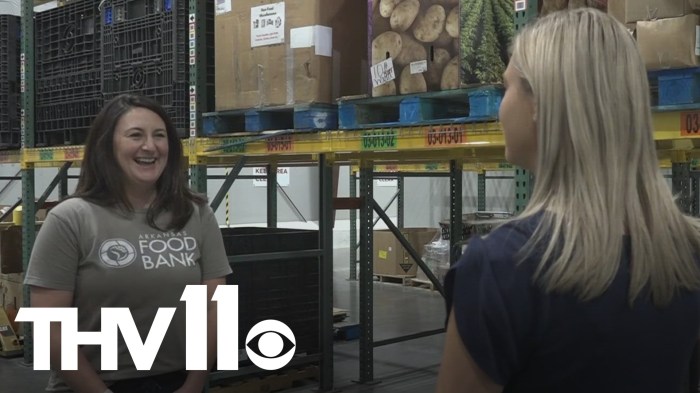Food insecurity affecting more than 89,000 in Northwest Arkansas is a stark reality, highlighting a growing need for resources and support. This issue impacts individuals and families across the region, impacting their health, well-being, and economic stability. The problem is multifaceted, with factors like poverty, rising food prices, and limited access to healthcare all contributing to the crisis.
Understanding the scale of food insecurity, its contributing factors, and its consequences is crucial to developing effective solutions.
Northwest Arkansas, known for its vibrant economy and growing population, faces a hidden struggle. The number of people experiencing food insecurity is staggering, representing a significant portion of the region’s residents. This issue is not limited to a specific demographic; it affects individuals and families from all walks of life.
While there are existing resources and support systems in place, they are often insufficient to meet the growing need.
Existing Resources and Support Systems
Northwest Arkansas, like many other regions, has a network of organizations and programs dedicated to addressing food insecurity. These resources offer a lifeline to individuals and families struggling to access nutritious meals.
Food Assistance Programs in Northwest Arkansas
The region has a robust network of food assistance programs, including food banks, soup kitchens, and government assistance programs. These organizations work tirelessly to provide food to those in need.
Food Banks
- The Food Bank of NWA: This organization serves as a central hub for food distribution in the region. It partners with local food pantries and soup kitchens to ensure food reaches those in need. They offer a variety of programs, including emergency food assistance, mobile pantries, and nutrition education.
- Manna Food Pantry: Located in Bentonville, Manna Food Pantry provides food assistance to individuals and families in Benton County. They offer a variety of services, including emergency food boxes, a community garden, and a food bank.
- Fayetteville Food Bank: This organization provides food assistance to residents of Fayetteville and Washington County. They offer a variety of services, including emergency food boxes, a mobile pantry, and a community garden.
Soup Kitchens
- The Salvation Army: This organization operates soup kitchens in several locations throughout Northwest Arkansas, providing hot meals to those in need. They also offer other services, such as clothing assistance and case management.
- The Seven Hills Homeless Center: This organization provides a variety of services to individuals experiencing homelessness, including meals, shelter, and job training. Their soup kitchen offers hot meals to those in need.
- The Community Clinic: Located in Fayetteville, the Community Clinic offers a variety of health services, including a food pantry that provides groceries to low-income families.
Government Assistance Programs
- SNAP (Supplemental Nutrition Assistance Program): This federal program provides food assistance to low-income families. Eligibility is based on income and household size. Individuals can apply for SNAP benefits through the Arkansas Department of Human Services.
- WIC (Women, Infants, and Children): This federal program provides food assistance and nutrition education to low-income pregnant women, breastfeeding women, and children under the age of five. Eligibility is based on income and nutritional risk.
- School Breakfast and Lunch Programs: These programs provide free or reduced-price meals to eligible students in public schools. Eligibility is based on household income.
Strengths and Limitations of Existing Programs
The food assistance programs in Northwest Arkansas have several strengths, including:
- Wide reach: The programs are available in various locations throughout the region, making it easier for those in need to access food assistance.
- Diverse services: The programs offer a variety of services, including emergency food assistance, hot meals, and nutrition education. This helps to address the diverse needs of individuals and families experiencing food insecurity.
- Collaboration: The programs work together to ensure that food assistance is available to those in need. This collaboration helps to avoid duplication of services and ensures that resources are used effectively.
However, these programs also face some limitations:
- Funding challenges: Many of these programs rely on donations and grants, which can be limited. This can make it difficult to meet the growing demand for food assistance.
- Eligibility restrictions: Some programs have strict eligibility requirements, which can exclude individuals and families who are struggling but do not meet the criteria.
- Limited access to fresh produce: While many programs provide non-perishable food items, access to fresh produce can be limited. This can impact the nutritional quality of food assistance.
Table of Food Assistance Programs in Northwest Arkansas, Food insecurity affecting more than 89,000 in Northwest Arkansas
| Program Name | Services Offered | Eligibility Requirements | Contact Information |
|---|---|---|---|
| The Food Bank of NWA | Emergency food assistance, mobile pantries, nutrition education | Income-based eligibility | (479) 756-1122 |
| Manna Food Pantry | Emergency food boxes, community garden, food bank | Income-based eligibility | (479) 271-1555 |
| Fayetteville Food Bank | Emergency food boxes, mobile pantry, community garden | Income-based eligibility | (479) 521-1255 |
| The Salvation Army | Hot meals, clothing assistance, case management | No eligibility requirements | (479) 521-2769 |
| The Seven Hills Homeless Center | Meals, shelter, job training | Homeless individuals and families | (479) 521-1222 |
| The Community Clinic | Health services, food pantry | Low-income families | (479) 521-1212 |
| SNAP (Supplemental Nutrition Assistance Program) | Food assistance | Income-based eligibility | Arkansas Department of Human Services: (800) 482-8986 |
| WIC (Women, Infants, and Children) | Food assistance, nutrition education | Income-based eligibility, nutritional risk | Arkansas Department of Human Services: (800) 482-8986 |
| School Breakfast and Lunch Programs | Free or reduced-price meals | Income-based eligibility | Local school district |
Strategies for Addressing Food Insecurity: Food Insecurity Affecting More Than 89,000 In Northwest Arkansas
Food insecurity is a complex issue with no easy solutions. Addressing it in Northwest Arkansas requires a multi-pronged approach that considers both short-term relief and long-term systemic changes.
Comprehensive Strategy for Addressing Food Insecurity
A comprehensive strategy to address food insecurity in Northwest Arkansas should encompass a combination of short-term and long-term solutions. Short-term solutions focus on immediate relief, such as providing food assistance and expanding access to existing resources. Long-term solutions aim to address the root causes of food insecurity, such as poverty, lack of affordable housing, and limited access to healthy food options.
Check Missouri Supreme Court narrowly upheld abortion rights on ballots, opinion shows to inspect complete evaluations and testimonials from users.
Policy Changes to Improve Food Access
Policy changes can play a crucial role in improving food access and reducing food insecurity.
- Increasing Minimum Wage:Raising the minimum wage would provide low-income workers with more disposable income, allowing them to afford basic necessities, including food.
- Expanding Access to Affordable Housing:A lack of affordable housing is a major contributor to food insecurity. Increasing the supply of affordable housing units would reduce housing costs for low-income families, freeing up more money for food.
- Strengthening Social Safety Nets:Social safety nets, such as SNAP (Supplemental Nutrition Assistance Program) and TANF (Temporary Assistance for Needy Families), provide essential support to low-income families. Expanding eligibility criteria and increasing benefits would ensure that more people have access to these vital programs.
Community-Based Initiatives to Address Food Insecurity
Community-based initiatives can play a vital role in addressing food insecurity.
- Community Gardens:Community gardens provide residents with access to fresh, healthy produce, while also fostering a sense of community and promoting healthy eating habits.
- Food Pantries:Food pantries offer essential food assistance to those in need, providing a vital safety net for families struggling to make ends meet.
- Nutrition Education Programs:Nutrition education programs can empower individuals with the knowledge and skills to make healthy food choices, promoting better health and well-being.
Last Word

Addressing food insecurity in Northwest Arkansas requires a multifaceted approach that involves both short-term and long-term solutions. By increasing access to affordable food, providing job training and employment opportunities, and strengthening social safety nets, communities can work towards creating a more equitable and food-secure future.
It’s essential to remember that food insecurity is not just a problem for individuals; it’s a community issue that requires collective action and commitment.
Questions and Answers
What are the most common reasons for food insecurity in Northwest Arkansas?
The most common reasons include low wages, unemployment, rising food prices, and limited access to affordable housing and healthcare. These factors can create a cycle of poverty that makes it difficult for individuals and families to afford nutritious food.
What are some of the health consequences of food insecurity?
Food insecurity can lead to malnutrition, chronic diseases like diabetes and heart disease, and mental health issues like depression and anxiety. Children are particularly vulnerable to the negative health impacts of food insecurity, as it can affect their growth and development.
How can I help address food insecurity in my community?
There are many ways to help! You can volunteer at local food banks or soup kitchens, donate to food assistance programs, or advocate for policy changes that address the root causes of food insecurity. Even small actions can make a difference.
 CentralPoint Latest News
CentralPoint Latest News



